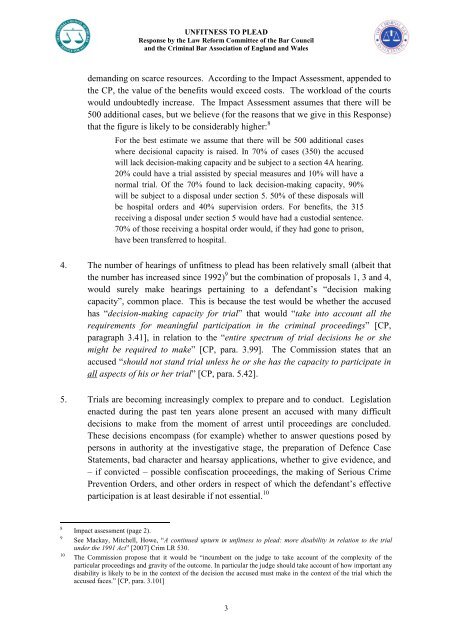Unfitness to Plead Consultation Responses - Law Commission ...
Unfitness to Plead Consultation Responses - Law Commission ...
Unfitness to Plead Consultation Responses - Law Commission ...
You also want an ePaper? Increase the reach of your titles
YUMPU automatically turns print PDFs into web optimized ePapers that Google loves.
UNFITNESS TO PLEAD<br />
Response by the <strong>Law</strong> Reform Committee of the Bar Council<br />
and the Criminal Bar Association of England and Wales<br />
demanding on scarce resources. According <strong>to</strong> the Impact Assessment, appended <strong>to</strong><br />
the CP, the value of the benefits would exceed costs. The workload of the courts<br />
would undoubtedly increase increase. The Impact Assessment assumes that there will be<br />
500 00 additional cases, but we believe (for the reasons that we give in this Response)<br />
that the figure is likely <strong>to</strong> be considerably higher higher: 8<br />
According <strong>to</strong> the Impact Assessment, appended <strong>to</strong><br />
the CP, the value of the benefits would exceed costs. The workload of the courts<br />
. The Impact Assessment assumes that there will be<br />
00 additional cases, but we believe (for the reasons that we give in this Response)<br />
For the best estimate we assume that there will be 500 additional cases<br />
where decisional capacity is raised. In 70% of cases (350) the accused<br />
will lack decision-making making capacity and be subject <strong>to</strong> a section 4A hearing.<br />
20% could have a trial assisted by special measures and 10% will have a<br />
normal trial. Of the 70% found <strong>to</strong> lack decision decision-making making capacity, 90%<br />
will be subject <strong>to</strong> a disposal under section 5. 50% of these disposals will<br />
be hospital orders and 40% supervision orders. For benefits, the 315<br />
receiving a disposal under section 5 would have had a cus<strong>to</strong>dial sentence.<br />
70% of those receiving a hospital order would, if the they y had gone <strong>to</strong> prison,<br />
have been transferred <strong>to</strong> hospital.<br />
4. The number of hearings of unfitness <strong>to</strong> plead has been relatively small (albeit that<br />
the number has increased since 1992)<br />
would surely make hearings perta<br />
capacity”, common place.<br />
has “decision-making capacity for trial<br />
requirements for meaningful participation in the criminal<br />
paragraph 3.41], in relation <strong>to</strong><br />
might be required <strong>to</strong> make<br />
accused “should not stand trial unless he or she has the capacity <strong>to</strong> participat<br />
all aspects of his or her trial<br />
9 (albeit that<br />
but the combination of proposals 1, 3 and 4,<br />
would surely make hearings pertaining <strong>to</strong> a defendant’s “decision decision making<br />
common place. This is because the test would be whether the accused<br />
making capacity for trial” that would “take take in<strong>to</strong> account all the<br />
requirements for meaningful participation in the criminal proceedings” proceedings [CP,<br />
], in relation <strong>to</strong> the “entire entire spectrum of trial decisions he or she<br />
might be required <strong>to</strong> make” [CP, para. 3.99]. The <strong>Commission</strong> states that an<br />
should not stand trial unless he or she has the capacity <strong>to</strong> participate participat in<br />
aspects of his or her trial” [CP, para. 5.42].<br />
5. Trials are becoming increasingly complex <strong>to</strong> prepare and <strong>to</strong> conduct. Legislation<br />
enacted during the past ten years alone present an accused with many difficult<br />
decisions <strong>to</strong> make from the moment of aarrest<br />
until proceedings are concluded.<br />
These decisions encompass (for example) whether <strong>to</strong> answer questions posed by<br />
persons in authority at the investigative stage, the preparation of Defence Case<br />
Statements, bad character and hearsay applications, whether <strong>to</strong> give evidence, and<br />
– if convicted – possible confiscation proceedings, the making of Serious Crime<br />
Prevention Orders, and other orders in respect of which the defendant’s effective<br />
participation is at least desirable if not essential essential. 10<br />
Trials are becoming increasingly complex <strong>to</strong> prepare and <strong>to</strong> conduct. Legislation<br />
enacted during the past ten years alone present an accused with many difficult<br />
rrest until proceedings are concluded.<br />
whether <strong>to</strong> answer questions posed by<br />
, the preparation of Defence Case<br />
r <strong>to</strong> give evidence, and<br />
possible confiscation proceedings, the making of Serious Crime<br />
and other orders in respect of which the defendant’s effective<br />
8<br />
Impact assessment (page 2).<br />
9<br />
See Mackay, Mitchell, Howe, “A A continued upturn in unfitness <strong>to</strong> plead: more disabil disability ity in relation <strong>to</strong> the trial<br />
under the 1991 Act” ” [2007] Crim LR 530.<br />
10<br />
The <strong>Commission</strong> propose that it would would be “incumbent on the judge <strong>to</strong> take account of the complexity of the<br />
particular proceedings and gravity of the outcome. In particular the judge shou should ld take account of how important any<br />
disability is likely <strong>to</strong> be in the context of the decision the accused must make in the context of the trial which the<br />
accused faces.” [CP, para. 3.101]<br />
3

















